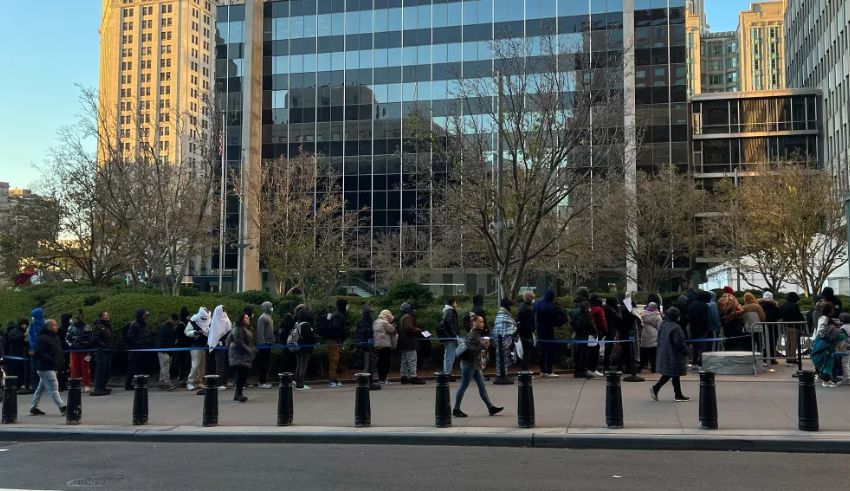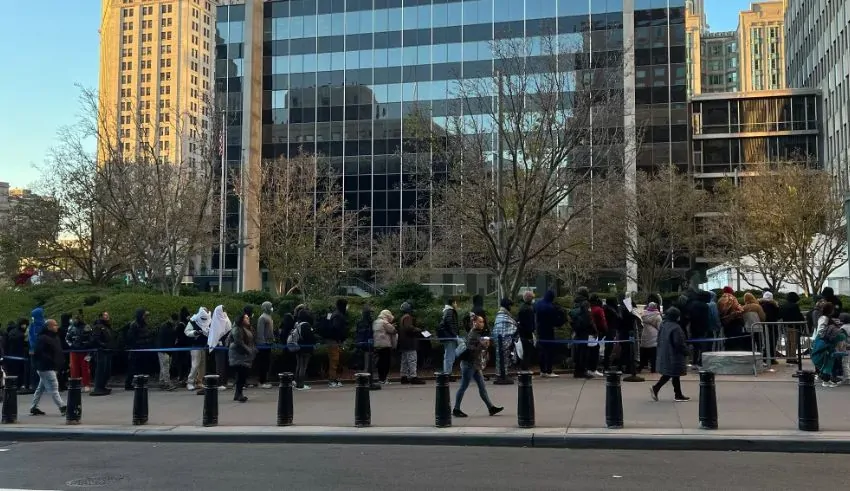

(C) FAIR
Nearly 224,000 migrants who crossed the U.S.-Mexico border have arrived in New York City seeking refuge; an unheard-of inundation. At expense to the city billions of dollars, this flow of immigrants has taxed public resources, schools, and shelters. As the end of 2024 approaches, the city notes improvement in crisis management; nonetheless, with the new Trump government it still confronts great challenges.
By January 2024, over 70,000 asylum seekers were nightly occupying the temporary housing and shelters set out for them. About a year later, city officials noted a turning point. According to a spokeswoman, “We are continuing seeing weekly drops in the total number of folks using our shelter system. In reaction, we are consolidating emergency shelter activities and reducing the current site count.”
Down from record levels earlier in the year, over 56,000 migrants are still under city custody. For regions with shelters, this still presents a significant challenge even if it indicates progress. Advocates such as Power Malu from Artists, Athletes, and Activists highlight that many migrants live in “limbo,” negotiating uncertain futures relying on city support.
New York City’s costs on migrant care and homelessness have lately increased dramatically. According to a Department of Investigation study, shelter expenses increased from $2.7 billion in fiscal year 2022 to $4 billion in 2024. Now making a significant portion of those housed in city-funded facilities, immigrants help to drive shelter occupancy to historically unheard-of levels.
During the crisis, the Roosevelt Hotel turned into the city’s intake hub; but, as shelters were overloaded, hundreds of migrants found themselves sleeping on pavements. Images of families waiting outside the hotel drew attention to the appalling circumstances and inspired criticism as well as calls to action.
Initially welcoming immigrants, Mayor Eric Adams strengthened New York’s right-to–shelter mandate and reputation as a sanctuary city. Among other basic needs, the city provided food, clothing, and medical treatment. As the migrant count rose, officials tightened rules to help to manage the issue.
One such policy was an executive order limiting where and when migrants might be dropped off by charter buses in response to Texas Governor Greg Abbott’s habit of busing migrants to cities with Democratic mayors. New York City has alone received around 46,000 migrants under this scheme.
Under the Biden government, federal policies evolved to address the national issue. Overburdened times in June 2024 saw President Joe Biden seek a stop to asylum procedures; later, in September, he passed stricter immigration rules. Supporters argue that although many people have been left stranded in unstable conditions, these policies have decreased migration numbers.
Working directly with immigrants, groups like Artists, Athletes, and Activists have provided grassroots support. Malu says the decline in new arrivals is obvious even if the present migrant population of the city still requires significant assistance. Underlining the ongoing need for structural answers, he said, “We still have people in shelters and in limbo.”
Personal stories of resistance like that of Venezuelan migrant Dennis Rico characterize the context. Arriving in New York City in 2023, Rico began selling classic arepas outside of Manhattan’s Row Hotel, a once-luxury hotel turned migrant sanctuary. His business grew, thereby allowing him to increase his daily pay from $100 to $120.
Rico’s family of three has Temporary Protected Status (TPS), hence his daughter could be able to pick up English and go to school. Rico wants his street-side stand to be a brick-and-mortar business now. His story highlights the potential of immigrants to support the growth of their new countries given the opportunity.
As Donald Trump gets ready for inauguration in January 2025, the path of New York’s immigrants is yet undetermined. Trump has vowed huge deportations, including a cut in TPS, which now protects about a million migrants including Rico and his family.
While Trump’s intentions give deporting people with criminal records primary attention, supporters caution that more generic categories could be targeted by expanded efforts, potentially terrifying migrant populations. Though their legal and practical consequences are yet uncertain, such mass deportations might have a significant impact on cities like New York, where immigrants have started new lives.
Even while initiatives in reducing shelter counts and processing work authorization applications—84,000 applications have been received thus far—have advanced, the city still suffers with long-term effects of the crisis. Since 70% of the eligible immigrants have either completed or gotten work permits, many of them, according to officials, have been able to advance toward self-sufficiency.
Still, the city’s ongoing financial burden and approaching change in federal policies indicate that the migrant issue is not quite gone. As New York City adapts to new challenges, the resiliency of its migrant population and the city’s commitment to humanitarian answers will be put to the test.
Once again crowned the world's best entrepreneurship nation in the Global Entrepreneurship Monitor (GEM) Report, the UAE has claimed the…
At age 24 Mykhailo Polyakov from America violated regulations when he came to North Sentinel Island which authorities guard to…
The much awaited action thriller Runner is getting boosted with a stellar cast. Directed by Scott Waugh, the film has…
Emirates has launched a new product, Emirates Courier Express, which promises faster, more reliable, flexible express shipping to customers around…
Nintendo has announced the new Switch 2 to stir the gaming world with some fabulous features. This console of the…
The 65-year-old Val Kilmer, versatile and magnetic actor famous for his works in Top Gun, Batman Forever, and The Doors,…
This website uses cookies.
Read More